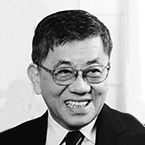
Takashi Sugimura, MD, a pioneer in biochemistry, a Fellow of the AACR Academy, and a major international figure in cancer research, died Sept. 6, 2020, at the age of 94.
Sugimura was born in Tokyo, Japan, on April 20, 1926. He received his medical degree from the School of Medicine of Tokyo University in 1949 and a Doctor of Medical Science degree from the same institution in 1957.
In 1960, Sugimura joined the staff of the National Cancer Center Research Institute in Tokyo, and he became the director of the institute in 1974. From 1970 to 1985, he was a professor of Molecular Biology at the Institute of Medical Science at Tokyo University. In 1977, he was a Fogarty Scholar in Residence at the National Institutes of Health in Bethesda, Maryland. Sugimura became president of Japan’s National Cancer Center in 1984, then became president emeritus in 1992. He also served as president of Toho University.
Sugimura’s research established that cancer is a disease caused by alterations in DNA. His work demonstrated the relationship between mutagenicity and carcinogenicity, adding greatly to the scientific understanding of how cancer develops. Sugimura isolated and identified many mutagens with a structure of heterocyclic amines from foods cooked under ordinary conditions and showed that tumors induced by these heterocyclic amines had genetic alterations. Sugimura further developed his studies to analyze multi-step carcinogenesis at the molecular level to promote effective primary prevention of cancer.
Additionally, Sugimura’s research group co-identified the novel polymer poly (ADP-ribose) polymerase (PARP). He also discovered the cognate catabolic enzyme poly (ADP-ribose) glycohydrolase (PARG). His work has had a profound effect on identifying new mechanisms of chemical carcinogenesis and new tumor promoters.
Sugimura became a member of the AACR in 1969. He was elected an Honorary Member of the AACR in 1980 and was elected to the inaugural class of Fellows of the AACR Academy in 2013. He played a major part in establishing the highly successful AACR/Japanese Cancer Association Joint Conference series that began in 1989 and served as cochair of the first conference along with past president, Enrico Mihich, MD. This joint conference is held every three years in Hawaii. Sugimura served with distinction as an Associate Editor of the AACR journal Cancer Research from 1990 to 2009, and on the Editorial Board of Cancer Epidemiology, Biomarkers & Prevention from 1991 to 2011. His extraordinary achievements as a scientist of international repute and as a brilliant leader in the cancer field were featured five times on the cover of Cancer Research.
Sugimura was Editor-in-Chief of the Japanese Journal of Cancer Research (now Cancer Science) from 1981 to 1995, and Editor Emeritus thereafter. He served as the chair of the Scientific Advisory Committee of the Princess Takamatsu Cancer Research Fund for 25 years, from 1989 to 2014, and made significant contributions to the activities of the Fund, including the Princess Takamatsu Research Fund International Symposium that is held each autumn in Tokyo. He also played an important role in establishing the AACR-Princess Takamatsu Memorial Lectureship Award in 2007, which continues today as a symbol of the close relationship between U.S. and Japanese cancer science.
Among many career honors, Sugimura received the Japan Academy Prize and Imperial Prize in 1976, the Outstanding Work Award from the Environmental Mutagen Society (U.S.) in 1978, the Order of Cultural Merits of the Japanese Government in 1981, the Charles S. Mott Prize from the General Motors Cancer Research Foundation in 1981, the Tomizo Yoshida Prize from the Japanese Cancer Association in 1992, and the Japan Prize for Biotechnology in Medicine in 1997.
He was an elected foreign associate of the National Academy of Sciences and the Institute of Medicine (U.S.), and an elected foreign member of the Royal Netherlands Academy of Arts and Sciences and the Royal Swedish Academy of Sciences.
“Dr. Sugimura was an international icon in the cancer field and one who will always be respected for his intellectual contributions to research, for his amazing leadership abilities, and for his passion for cancer science,” said Margaret Foti, PhD, MD (hc), chief executive officer of the AACR.
Career Highlights
1997 Japan Prize for Biotechnology in Medicine
1994 Elected Foreign Associate, Institute of Medicine
1992 Tomizo Yoshida Prize, Japanese Cancer Association
1987 Elected Foreign Member, Royal Swedish Academy of Sciences
1987 Elected Foreign Member, Royal Netherlands Academy of Arts and Sciences
1984-1991 President, National Cancer Center, Tokyo, Japan
1982 Elected Foreign Associate, National Academy of Sciences, Washington, D.C.
1981 Charles S. Mott Prize, General Motors Cancer Research Foundation
1981 The Order of Cultural Merits of the Japanese Government
1980 Honorary Member, American Association for Cancer Research
1978 Outstanding Work Award, Environmental Mutagen Society of the United States
1977 Fogarty Scholar in Residence, National Institutes of Health, Bethesda, MD
1976 Japan Academy Prize and Imperial Prize
1970-1985 Professor, Institute of Medical Science, University of Tokyo
1949 MD, University of Tokyo